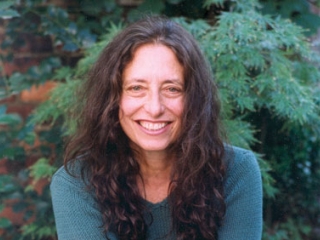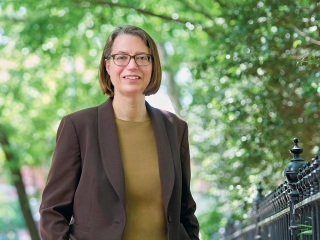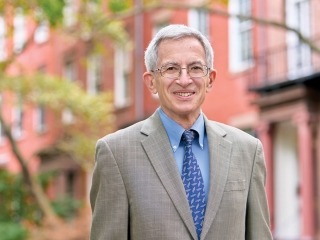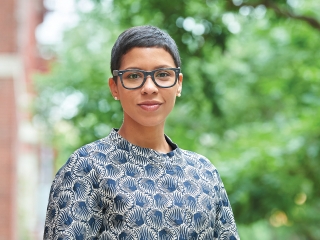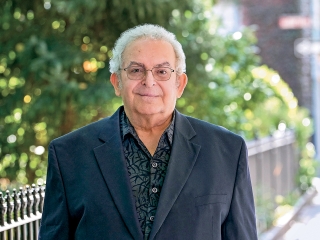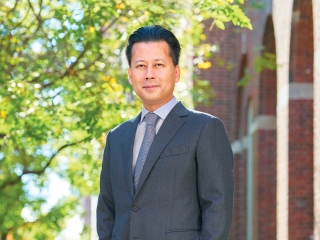Family, Gender, & Sexuality

Overview
Kenji Yoshino, author of Speak Now: Marriage Equality On Trial and Covering, leads the Meltzer Center for Diversity, Inclusion, and Belonging. David Richards is the author of Why Love Leads to Justice: Love Across the Boundaries, and Carol Gilligan is the author of the ground-breaking feminist text In A Different Voice. Together, they teach Resisting Injustice, a class that considers the coincidence of sexual liberation and ethical protest in the 1960s, focusing on the civil rights and anti-war movements, second wave feminism, and gay rights. Melissa Murray’s research focuses on the legal regulation of sex and sexuality and encompasses such topics as marriage and its alternatives, the marriage equality debate, the legal recognition of caregiving, and reproductive rights and justice.
Students also have the option of enrolling in clinics to get a first-hand experience of legal advocacy. Clinics and externships offered in this area include the Family Defense Clinic, the LGBTQ+ Rights Externship, and the Reproductive Justice Clinic.
Outside of the classroom, students can also round out their study with student groups such as OUTLaw and If/When/How: Lawyering for Reproductive Justice. NYU Law’s centers also highlight issues pertaining to family, gender, and sexuality throughout the year with a wide range of events and lectures.
NYU Law’s centers and student organizations highlight issues pertaining to family, gender, and sexuality through various events each year.
Through leadership training, research, and initiatives to advance workplace equity, the Birnbaum Women's Leadership Center develops NYU Law students’ leadership skills, supports the Law School as an environment that nurtures women’s achievement, and engages the legal profession to better enable women lawyers to fulfill their potential.
The Meltzer Center for Diversity, Inclusion, and Belonging’s mission is to advance interdisciplinary legal scholarship on diversity, inclusion, and belonging; support the Law School community as it strives to live up to those values; and share expertise with the broader world through targeted engagement with public and private institutions.
Student journals include the Review of Law and Social Change. Student groups include OUTLaw and If/When/How: Lawyering for Reproductive Justice.
At NYU Law, students are encouraged to take advantage of all the Law School has to offer, from working directly with faculty on their research, to getting involved with our centers, to participating in clinics and student organizations. The Office of Career Services, along with the Public Interest Law Center, also organizes numerous recruiting programs, panels and workshops, practice interview programs, and offers individual counseling sessions. Here are some opportunities for those specifically interested in family, gender, and sexuality:
Student journals include the Review of Law and Social Change. Student groups include OUTLaw and If/When/How: Lawyering for Reproductive Justice.
Clinical Work
- Family Defense Clinic
Family Defense Clinic students participate in a year-long, 14-credit course that examines child welfare policy and practice. The clinic’s primary focus is on preventing the unnecessary break-up of indigent families and helping separated families reunite by representing individual parents and relatives of children who are in or at risk of foster care placement. The clinic also undertakes projects designed to address systemic problems in the foster care and Family Court systems. The clinic involves a mixture of fieldwork, seminar meetings, and participation in simulated exercises and hearings.
- LGBTQ+ Rights Externship
In the LGBTQ+ Rights Externship, students conduct fieldwork at NY-based non-profit organizations representing LGBTQ individuals. Students are placed at partnering organizations such as the Anti-Violence Project, Immigration Equality; Lambda Legal; the LGBTQ Rights Project at the New York Legal Assistance Group; the Peter Cicchino Youth Project at the Urban Justice Center, and The Sylvia Rivera Law Project. Substantive case work may include sexual-orientation or gender identity-based asylum claims; discrimination claims; transgender documentation issues (such as correcting gender on a birth certificate); housing cases; or orders of protection. A seminar focusing on the unique legal issues faced by LGBTQ individuals completes the students’ work.
- Reproductive Justice Clinic
The Reproductive Justice Clinic trains students in the legal knowledge and skill required to secure fundamental liberty, justice and equality for people across their reproductive lives, with a particular focus on pregnancy and birth. For current clinic work, this is achieved primarily through advocacy and litigation around legal or policy frameworks restricting the autonomy and undermining the equality of pregnant, parenting, and birthing women; or, punishing women by virtue of their reproductive status.
Scholarships and Fellowships
- Arthur Garfield Hays Civil Liberties Program
Arthur Garfield Hays Civil Liberties Program, founded in 1958, awards fellowships to a small group of third-year students committed to civil liberties and offers them unique opportunities to pursue public interest careers.
- Center for Human Rights & Global Justice
The Center for Human Rights & Global Justice (CHRGJ) has built a reputation for academic and clinical work in human rights subjects—including counter-terrorism; corporate abuses; caste discrimination; gender-based violence; economic, social, and cultural rights; and extrajudicial executions. Opportunities are available for current students and they also have a human rights job board.
- Derrick Bell Scholarship for Public Service
The Derrick Bell Scholarship for Public Service promotes the practice of law in the public service sector by NYU Law graduates. Members of APALSA, BALSA, LaLSA, MELSA, MLSA, or SALSA who have proven their dedication to public service and who plan to pursue careers in public interest law are eligible.
- Root-Tilden-Kern Program
The Root-Tilden-Kern Program, established more than 50 years ago, awards full tuition to 20 scholars who are selected for commitment to working in public service, academic merit, and leadership potential.
- Sinsheimer Service Scholarship
The Sinsheimer Service Scholarship pays full tuition each year for a student of outstanding academic merit and leadership potential who demonstrates a strong commitment to providing direct representation in civil legal matters to individuals who cannot otherwise afford such representation and promises to pursue such work in the United States for at least three years. Sinsheimer Scholars are selected as part of the Root-Tilden-Kern Scholarship selection process and participate in all program activities including the first-year orientation and monthly dinners.
Post-Graduate Opportunities
- Sinsheimer Children’s Rights Fellowship
The Sinsheimer Children’s Rights Fellowship is a two-year post-graduate fellowship at Partnership for Children’s Rights in New York City. The Sinsheimer Fellow will represent families in administrative hearings brought against the NYC Department of Education to secure appropriate educational placements and services for children with learning, emotional and physical disabilities. This fellowship is restricted to NYU 3Ls and recent NYU Law graduates.
- Master of Laws LLM
The Master of Laws LLM is designed for students who wish to take full advantage of NYU’s extraordinarily wide range of course offerings and the diverse research interests of our faculty. Unlike students in the specialized LLM programs, candidates pursuing the traditional LLM degree are not limited to a specific number of classes in one field, and they have the freedom to choose courses that match their interests.
Faculty
University Professor
Assistant Professor of Law
Director, Family Defense Clinic
Vice Dean, Curriculum
Fiorello LaGuardia Professor of Law
Frederick I. and Grace Stokes Professor of Law
Faculty Director, Birnbaum Women’s Leadership Center
Edwin D. Webb Professor of Law
Chief Justice Earl Warren Professor of Constitutional Law
Featured News
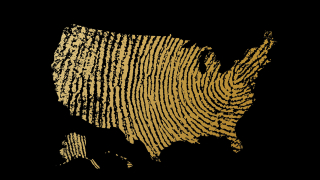
How Equality Wins
Kenji Yoshino and David Glasgow LLM ’14 offer a new roadmap for diversity, equity, and inclusion.
My NYU Law
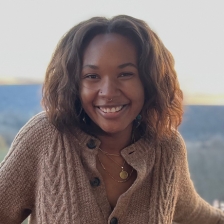
Kelsey Brown ’24
“Working in the Family Defense Clinic [was] the highlight of my law school experience. As student advocates, we work[ed] directly with parents whose children are in foster care, specifically focusing on defending them against state intervention, helping them reunify with their children, and ensuring their families get the resources they need.”
Areas of Study
Get a sense of our academic specialties and the faculty that teach them—as well as the centers, colloquia, lectures, and student organizations that underscore them.
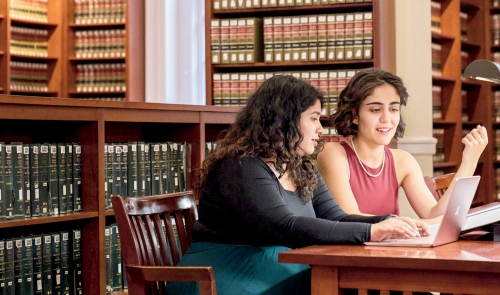
- Antitrust, Intellectual Property, & Information
- Cities & Land Use
- Constitutional, Civil Rights, & Democracy
- Corporate & Commercial Law
- Criminal Justice
- Environmental
- Family, Gender, & Sexuality
- Global & International
- Human Rights
- Immigration
- Labor & Employment
- Law and Security
- Legal Theory, History, & the Social Sciences
- Litigation & Procedure
- Regulation & Public Policy
- Taxation


